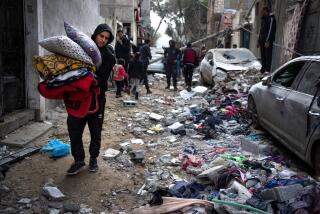COLUMN LEFT / JESSE JACKSON : We May Get Burned by the Cuba Embargo : Fomenting economic devastation to unseat Castro is especially shameful in light of Clinton’s warmth toward China.
- Share via
As you sow, so shall you reap, the Bible teaches. Cynics warn that the worst you can do to someone is grant him what he desires. Apply this warning to U.S. policy toward Cuba, for we may soon pay dearly if our policy succeeds.
For more than 30 years, the United States has waged war against Fidel Castro and his revolution. The CIA organized a covert army to invade the island, leading to the Bay of Pigs debacle. The Cuban missile crisis brought us to the edge of nuclear war. The CIA then ran what Lyndon Johnson called a Caribbean “Murder, Inc.,” enlisting the Mafia and others in attempts to assassinate Castro. And all this time, we have maintained an illegal economic blockade of the island.
The collapse of the Soviet Union and the end of the Cold War led us to redouble our efforts. Rep. Robert Torricelli (D-N.J.), chair of the House subcommittee on Latin America, pledged that he would sow chaos in Cuba and pushed legislation that tightened the blockade, attempting to enforce it on foreign subsidiaries of U.S. corporations. Bill Clinton endorsed the bill while trolling for votes in Florida and, once elected, set about to enforce it--much to the dismay of our closest allies and trading partners.
The aim of the policy is to hasten economic collapse in Cuba in the hope of overthrowing Castro before he dies or resigns. A unilateral policy condemned by the United Nations, the economic embargo is a blatant violation of international law.
It also probably has helped to sustain the Castro regime by reinforcing its bunker mentality. In the old Soviet Bloc, state socialist regimes were shown to be most vulnerable when opened to trade, exchange, travel and communication.
Ironically, this is the argument President Clinton has begun making about China. That communist regime pursues policies directly contrary to U.S. interests, and its suppression of human rights is far worse than anything Castro has done. Yet Clinton was pleased to meet with the Chinese president in Seattle, and to allow China to buy a coveted supercomputer, sales of which previous administrations had blocked because of its military potential.
Clinton argues that contact and trade will have great effect on 1.1 billion Chinese on the other side of the globe, but little on 10 million Cubans 90 miles off our coast. The real difference is a question of price, not principle. The Chinese market beckons.
Powerful U.S. companies, like Boeing in Seattle, work assiduously to ease relations.
The Cuban market has no such importance or potential. So Clinton, who railed against George Bush for “coddling dictators” in China, now sups with the Chinese president while tightening the screw a little more on hapless Cubans.
U.S. Latin American experts fear that the Cuba policy may succeed. With its Soviet patron gone, the Cuban economy is in deep crisis. Oil is in short supply; factories can’t run; buses and cars are replaced by bikes; food is scarce. The CIA recently warned that conditions were bad enough to trigger a social uprising.
But if violence does break out in Cuba, the United States would be involved. Literally thousands of Cuban Americans would rent boats and set sail for Cuba, to save their relatives or to settle old scores. If the violence spread, the United States would be flooded with refugees it is legally mandated to accept.
So why does the policy go on? Virtually the entire professional corps of Latin American experts and diplomats opposes it. When asked to explain it, one high-ranking Clinton State Department appointee stated, “The State Department deals with foreign policy; Cuban policy is a domestic policy question.”
The policy has been bartered to the embittered anti-Castro Cuban-American lobby. Under the leadership of Jorge Mas Canosa, the Cuban-American National Foundation--a millionaires’ club of right-wing exiles with rich campaign coffers and the support of many South Florida voters--has taken virtual control of the policy. Ambitious politicians like Torricelli are amply rewarded with PAC money and other contributions for leading the charge.
But it is not simply the Cuba lobby that keeps the irrational policy going. The national-security apparatus--particularly the Central Intelligence Agency--bears a deep grudge toward Castro. His revolution embarrassed them. The Bay of Pigs mortified them. He confronted them in Angola, frustrating designs of the CIA’s brutal allies, Jonas Savimbi and apartheid South Africa. The CIA wants revenge, and its operatives resist efforts for a more rational and more effective policy.
What we must fear is that present U.S. policy may succeed. Then the Administration and the country will be faced with a costly disaster of its own design, one that could have been avoided.
More to Read
Sign up for Essential California
The most important California stories and recommendations in your inbox every morning.
You may occasionally receive promotional content from the Los Angeles Times.













